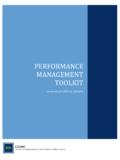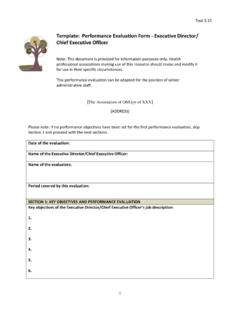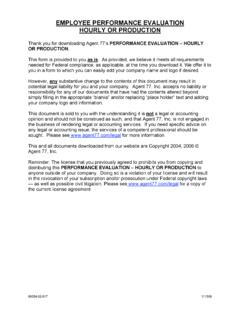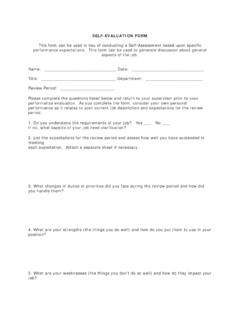Transcription of Performance Appraisal Handbook - Bureau of Indian Education
1 10/4/04 #370DM430HB-1 (Revised 09-10) 1 Working Smarter for America The Department of the Interior s Performance Appraisal Handbook A Guide for Managers/Supervisors and Employees Office of the Secretary Office of Human Resources 10/4/04 #370DM430HB-1 (Revised 09-10) 2 Timeline for the ess .. 3 Performance Appraisal ProcIntroduction .. 4 Table of ContentsSection 1- PLANNING .. 5 Developing Employee Performance Appraisal Plans (EPAP) .. 5 Elements .. 5 Standards (Benchmark Performance Standards) .. 6 Employee Participation .. 10 Documenting Elements and Standards .. 10 Section 2 MONITORING .. 10 Feedback during the Performance Year .. 10 Progress Reviews.
2 10 Section 3 DEVELOPING EMPLOYEES .. 12 Formal Development .. 12 Informal Development .. 13 Section 4 RATING .. 14 Eligibility .. 14 Interim Appraisals .. 14 Rating Critical Elements .. 14 Rating of Record .. 15 Discussion with Employee .. 15 Reconsideration Process .. 16 Section 5 ACTIONS BASED ON Performance .. 18 Rewarding Performance .. 18 Links to Other Personnel Actions .. 18 Dealing with Poor 19 APPENDIX 1 GPRA Examples for Individual Bureaus/Offices APPENDIX 2 Developing Performance Standards APPENDIX 3 A Supervisor s Guide on How to get the Most of out of Performance Appraisals APPENDIX 4 An Employee Guide on How to get the Most out of Performance Appraisals APPENDIX 5 Supervisor s Guide to Developing Individual Development Plans Sample Individual Development Plan APPENDIX 6 Checklists for Dealing with Poor Performance APPENDIX 7 Frequently Asked Questions APPENDIX 8 EPAP Supervisory Employee EPAP Employee EPAP Sample Completed EPAP Timeline for the Performance Appraisal System 10/4/04 #370DM430HB-1 (Revised 09-10)
3 3 5-Level Performance System Or as otherwise approved by the DOI Office of Human Resources Appraisal Period The Appraisal period coincides with the fiscal year, October 1 to September 30. Or 30 days after the end of the Performance Appraisal Period Complete the Performance Appraisal for prior fiscal year that ended on September 30. Or 60 calendar days from beginning of Appraisal cycle Deadline to finalize Performance standards Timeframe in which Performance standards are finalized and approved. 60 days is the time a rating official should have issued to employee elements and standards, , establish an Employee Performance Appraisal Plan (EPAP). Minimum Appraisal Period The length of time, 90 calendar days, that the employee must be performing under an approved EPAP in a given position in order to be eligible for an interim or annual rating.
4 Or approximately midway through Performance Appraisal period Progress Review Discussion with the employee at least once during the Appraisal period to review the employee s progress and communicate Performance as compared to the established standards; to make any recommended revisions to critical elements/ Performance standards; and to consider/identify any developmental needs or Performance improvement required. Interim Appraisal Required when an employee has worked under standards in the position for 90 days and if one or more of the following occurs: Employee changes position ( , reassignment, promotion, change to lower grade, transfer), completes a temporary assignment of 120 days or more ( , detail, temporary promotion, etc.), the rating official leaves a supervisory position, or to document a level of competence determination for within-grade increase purposes when the employee s most recent rating of record is not consistent with the level of competence determination.
5 October 1 to September 30 October 1 to 31 October 1 to November 30 90 Calendar Days March through May As Required 10/4/04 #370DM430HB-1 (Revised 09-10) 4 This Handbook is designed for Department of the Interior rating officials and employees to assist with the management of employee Performance that is aligned with and supports organizational goals. It is divided into five areas coinciding with OPM s definition, with the final section expanded to include taking other actions based on Performance including dealing with poor Performance . INTRODUCTION Managing employee Performance is an integral part of the work that all managers and rating officials perform throughout the year. It is as important as managing financial resources and program outcomes because employee Performance or the lack thereof, has a profound effect on both the financial and program components of any organization.
6 The Department of the Interior s Performance management policy is designed to document the expectations of individual and organizational Performance , provide a meaningful process by which employees can be rewarded for noteworthy contributions to the organization, and provide a mechanism to improve individual/organizational Performance as necessary. To accomplish these objectives, managers need to identify organizational goals to be accomplished, communicate individual and organizational goals to employees that support the overall strategic mission and/or Government Performance and Results Act (GPRA) goals of the Department of the Interior, monitor and evaluate employee Performance , and use Performance as a basis for appropriate personnel actions, including rewarding noteworthy Performance and taking action to improve less than successful Performance .
7 The Office of Personnel Management defines Performance management as the systematic process of: planning work and setting expectations continually monitoring Performance developing the capacity to perform periodically rating Performance in a summary fashion; and rewarding good Performance 10/4/04 #370DM430HB-1 (Revised 09-10) 5 Performance elements tell employees what they have to do and standards tell them how well they have to do it. In an effective organization, work is planned in advance. This includes setting Performance expectations and goals for individuals in order to channel efforts toward achieving organizational objectives. Involving employees in the planning process is essential to their understanding of the goals of the organization, what needs to be done, why it needs to be done, and expectations for accomplishing goals.
8 DEVELOPING EMPLOYEE Performance Appraisal PLANS (EPAP) The regulatory requirements for planning an employee s Performance include establishing the elements and standards in their EPAP. An EPAP outlines the specific elements and standards that the employee is expected to accomplish during the rating cycle. Performance elements and standards should be strategically linked, results focused, measurable, understandable, verifiable, equitable, achievable, and provide for meaningful distinctions between levels of Performance . In addition, EPAPs should be flexible so that they can be adjusted for changing program objectives and work requirements. When used effectively, these plans can be beneficial working documents that are discussed often, and not merely paperwork that is filed in a drawer and seen only when ratings of record are required.
9 ENSURING EMPLOYEES UNDERSTAND THE Performance Appraisal SYSTEM Supervisors need to ensure that their employees have a good basic understanding of the Performance Appraisal System. A tool that explains the system, Understanding Performance Management, has been developed for that purpose and is provided as an attachment to the EPAP forms (DI-3100S and DI-3100 updated September 2009). Supervisors must provide that instructional tool to their employees and have them sign block A-3 on the cover page of the EPAP form when the Performance plan is established to document receipt. ELEMENTS The Department s policy outlines that employees may have a minimum of one and not more than five elements in their Appraisal plans, all of which will be considered critical. Through these elements, employees are held accountable as individuals for work assignments and responsibilities of their position.
10 A critical element is an assignment or responsibility of such importance that Unsatisfactory Performance in that element alone would result in a determination that the employee s overall Performance is Unsatisfactory. As defined by law, failure on one or more Critical elements can result in the employee s reassignment, removal, or reduction in grade. Consequently, Critical elements must describe work assignments and responsibilities that are significantly influenced by an employee s work effort and within the employee s control. For most employees this means that Critical elements cannot describe a group s Performance . However, a supervisor or manager can and should be held accountable for seeing that results measured at the group or team level are achieved.










